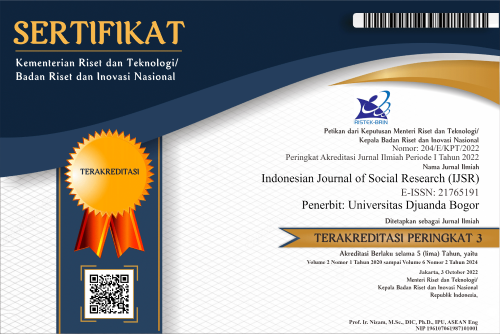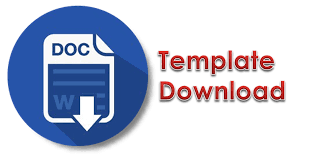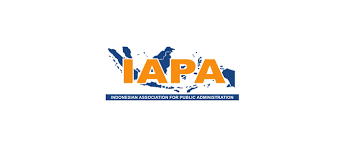Alleviating Poverty Through One House One Farm Project in Bangladesh
Abstract
Poverty is a bad inhalation process in the economic breath system, especially at the rural level in Bangladesh. The one house one farm project was initiated to alleviate poverty in Bangladesh as an initiative of Prime Minister Sheikh Hasina. The project focuses on rural households generating income through family farming with e-financial inclusion or online banking opportunities. The study focuses on the fundamental understanding and reasons for the One House One Farm project. The study follows a generic qualitative method with secondary data sources, including the website of The Project, newspaper articles, and journal articles, to indicate what, how, and why questions. With some beneficiaries' statements, an ethnographic study is conducted as another data collection source. The study introduces a thematic mode of analysis that covers the explanation of the pattern of the One House One Farm project and gives a general idea about the background. The study finds that the One House One Farm project was a primary and better initiative for alleviating or eradicating poverty in Bangladesh, which helps to focus on achieving Sustainable Development Goal- 01. Besides the main target of alleviating or eradicating poverty in Bangladesh, this project helped rural households create a basement for generating income and being free from dependency.
References
Abdin, M. (2014). Socio-economic challenges of Bangladesh. The Financial Express on December, 21.
Aminul Haque Shahin. (2020). Ektee Bari Ektee Khamar (EBEK) | Details of the Project, Benefits, Features | Job Circular, Exam, Admit Card. https://bangladeshus.com/ektee-bari-ektee-khamar-ebek/
Bappy Rahman. (2017). ‘One House, One Farm’: Promoting Self-Employment of Rural Poor. Daily Sun. https://www.daily-sun.com/printversion/details/268516
BSS. (2018). 35,000 families become self-reliant through ‘One House, One Farm.’ BSS. https://wp.bssnews.net/?p=26142
Chambers, R. (1995). Poverty and livelihoods: Whose reality counts? Environment and Urbanization, 7(1), 173–204.
Dhaka Tribune. (2015). Little done with ‘One House, One Farm’ project in Kishoreganj. Dhaka Tribune. https://www.dhakatribune.com/bangladesh/bangladesh-others/92236/little-done-with-%E2%80%98one-house-one-farm%E2%80%99-project-in
Dhaka Tribune. (2019). ‘One House One Farm Project’ employees want job regularization. Dhaka Tribune. https://www.dhakatribune.com/business/181434/%E2%80%98one-house-one-farm-project%E2%80%99-employees-want-job
General Economics Division (GED). (2022). Revised Mapping of Ministries/Divisions and Custodian/Partner Agencies for SDG Implementation in Bangladesh. Bangladesh Planning Commission Government of the People’s Republic of Bangladesh. https://moca.portal.gov.bd/sites/default/files/files/moca.portal.gov.bd/page/d555e235_3698_43c6_b594_e0cc79d2ab7a/2.%20Revised%20mapping_SDG6285b4af32172_doc_file%20%281%29.pdf
GNA. (2009). Bangladesh starts “one house one farm” project. Business Ghana. https://businessghana.com/site/news/business/93436/Bangladesh-starts-one-house-one-farm-project
Ishrat Zahan. (2016). One House One Farm.
Islam, I., Hoque, M., Miah, M. M., & Sheheli, S. (2014). Competency assessment of the farmers on the application of one house one farm approach. Progressive Agriculture, 24(1–2), 291–299.
Jannat, A., & Uddin, M. (2016). Farmers’ perception about’one house one farm’project and its impact on enterprise profitability in selected areas of Mymensingh district.
Ludi, E. (2016). POVERTY BRIEF – UNDERSTANDING POVERTY. Understanding Poverty.
Mahfuza Jasmine. (2023). PM’s ten special initiatives immensely empowers country’s womenfolk. Bangladesh Sangbad Sangstha, National News Agency of Bangladesh. https://www.bssnews.net/news/131712
MARUF IFTEKHAR KHAN. (2015). One House One Farm. https://www.bproperty.com/blog/one-house-one-farm/
Rural Development and Co-operative Division. (2018). Ektee Bari Ektee Khamar-Third Revision. Dhaka: http://www.ebek-rdcd.gov.bd.
Sachs, J. D., Flanagan, O., Sorondo, M. S., Vendley, W., Annett, A., & Thorson, J. (2022). Ethics in action for sustainable development. Columbia University Press.
The Daily Star. (2009). One house one farm scheme kicks off next month. The Daily Star. https://www.thedailystar.net/news-detail-119860
The Daily Star. (2010). Project to infuse dynamism into rural economy: PM. The Daily Star. https://www.thedailystar.net/news-detail-154510
The Daily Star. (2013). Specialised bank for the rural poor in the works. The Daily Star. https://www.thedailystar.net/news/specialised-bank-for-the-rural-poor-in-the-works
The World Bank. (n.d.). Poverty and Inequality. https://datatopics.worldbank.org/world-development-indicators/themes/poverty-and-inequality.html
OECD. (2001). The DAC Guidelines: Poverty Reduction. OECD Library. Retrieved from https://www.oecd-ilibrary.org/poverty-reduction_5lmqcr2kgv8v.pdf?itemId=%2Fcontent%2Fpublication%2F9789264194779-en&mimeType=pdf
Copyright (c) 2024 Indonesian Journal of Social Research (IJSR)

This work is licensed under a Creative Commons Attribution-ShareAlike 4.0 International License.
The Authors submitting a manuscript do so on the understanding that if accepted for publication, copyright publishing of the article shall be assigned/transferred to Indonesian Journal of Social Research (IJSR) Universitas Djuanda as Publisher of the journal. Upon acceptance of an article, authors will be asked to complete a 'Copyright Transfer Agreement'. An e-mail will be sent to the corresponding author confirming receipt of the manuscript together with a 'Copyright Transfer Agreement' form by online version of this agreement.
Indonesian Journal of Social Research (IJSR) Universitas Djuanda, the Editors and the Editorial Board make every effort to ensure that no wrong or misleading data, opinions or statements be published in the journal. In any way, the contents of the articles and advertisements published in the Indonesian Journal of Social Research (IJSR) Universitas Djuanda are sole and exclusive responsibility of their respective authors and advertisers.
Remember, even though we ask for a transfer of copyright, our journal authors retain (or are granted back) significant scholarly rights as mention before.
The Copyright Transfer Agreement (CTA) Form can be downloaded here: Copyright Transfer Agreement-IJSR 2020
The copyright form should be signed electronically and send to the Editorial Office e-mail below:
Dr. Rasmitadila, M.Pd (Editor-in-Chief)
Universitas Djuanda
Jl. Tol Jagorawi No.1, Ciawi, Kec. Ciawi, Bogor, Jawa Barat 16720
Website: http://journal.unida.ac.id/index.php/IJSR/index
Email: ijsr@unida.ac.id





4.png)



